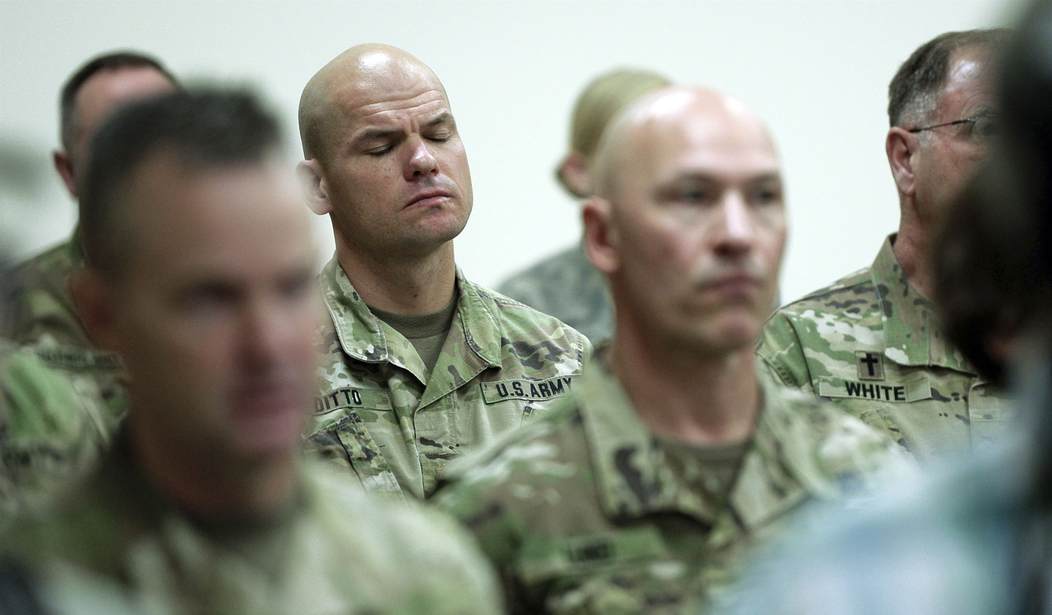The National Guard is walking point – working tirelessly – on the front lines of the coronavirus crisis. How many Americans know that? How many know that 45,000 members of the National Guard volunteered in support of their states, cities, towns, and communities in ways that put them in harm’s way and at direct risk of contracting coronavirus?
How many Americans – including members of Congress – know that our National Guard men and women are doing this, in some cases, without full medical coverage? Without coverage for those on shorter orders? Without typical transitional medical coverage? Wouldn’t this be the time to fix that?
Today, National Guard personnel are helping governors in all 50 states, plus in Washington, D.C., Puerto Rico and Guam. They are doing jobs few could imagine. As we “shelter-in-place” and wait out the curve’s flattening and national reopening, members of the National Guard are out there – every day – doing for us what we cannot do ourselves.
What are they doing? They are assisting the medical community, augmenting medical professionals in hospitals and eldercare facilities, creating and manning field hospitals, disinfecting nursing homes, coordinating life-saving medical equipment, delivering food to hundreds of thousands of Americans in hard-hit communities, assuring personal protective gear reaches first responders, and serving in numerous state emergency operations centers.
What else are they doing? They are selflessly and respectfully transporting bodies of those who die outside hospitals to local mortuaries, especially in “hot spots” like New York. They are coordinating state and local responses, using specialized training to backfill critical positions, screening virus symptoms at testing facilities and ports of entry, providing health protection assessments, spelling overburdened local law enforcement, and becoming a nationwide crisis-response force-multiplier. Quietly, they are putting lift under America’s wings.
Recommended
So, Americans should know that – without complaint or hesitation – the National Guard is on call, on track, and on mission for each of us. They are among our best. Like our selfless nurses and doctors, emergency medical technicians and first responders, in a new and challenging battlespace, they are out there – on the front lines.
What else is there to know? Just this: of more than 45,000 National Guard personnel mobilized in support of state and territorial responses to COVID-19, more than 80 percent fall under Title 32, section 502 (f), which means they serve at state direction with federal pay. More than 8,000 serve on “state active duty” orders. Some orders are short, some longer. The kicker? Serious gaps exist in their medical coverage. These should be fixed.
As National Guard men and women step up to confront an infectious, deadly disease – what the president has called an “invisible foe” – they and their families should not be worrying about whether they have the safety net of adequate medical care – yet they must. Discontinuities in coverage mean the Guard lacks full coverage. Any lack of full coverage does a grave disservice to our brave and faithful Guard members.
Those mobilizing on 30-day orders, for example, may miss access to critical health care, even as infection chances rise around them. Similarly, thousands on “state active duty” orders probably do not presently qualify for federal health care. Volunteers get no transitional coverage after battling this epidemic yet would get six months transitional coverage if returning from overseas duties. Making matters worse, uncertainties flow from a pre-virus shift in Guard resources to other missions.
Crises always call out nimble leadership, quick rethinking, readjustments, unexpected surges and backfills, reorganization, recalibration and taking stock of where we are – understanding circumstances we did not imagine we would have to consider – but do. This is such a moment.
As Congress begins to think anew about where gaps exist, where resources may need to be realigned, to those on the front lines, always remembering how necessary our National Guard is in times of crisis.
The men and women of the National Guard, and their loyal and silently supportive families, have America’s back, and we need to have theirs. These young men and women are fully committed to our nation’s health, prosperity, and recovery. We need to return the favor. But we also need to realize that it is much more than a favor – it is a sacred obligation.
Accordingly, whatever the next legislative moves by Congress – in addressing short and long-term effects of this crisis – they should pause to remember, fully support, and assure robust, equitable medical care for all members of the National Guard.
There is no other way to say what must be said: From augmenting frontline medical personnel, first responders, and law enforcement to virus testing, disinfecting, care for the elderly and mortuary duty, optimizing government to manning operations centers, these are great Americans. The National Guard is out there on the point – working tirelessly – on the front lines. They respond asking so little of us, which is why we must give them the absolute best that we can.
John C. Mosbey is a retired USAF colonel, and former Executive Director of the Center for Homeland Defense and Security of the Naval Postgraduate School. He spent many years in the field of National Guard support to Civil Authorities. Mosbey also writes nationally on defense, space policy and geopolitical issues and holds advanced degrees from Alabama, the Naval War College, and Trinity College, Dublin.

























Join the conversation as a VIP Member